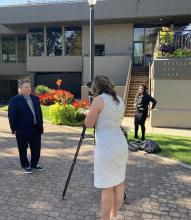
The Office of Independent Investigations (OII) met with a host of Spokane area organizations recently, including community advocacy groups and both local and federal law enforcement. During the trip, the team also visited a potential OII office in Spokane.
“As the second largest city in the state, we have long identified Spokane as a site where we would want one of our regional offices, so touring a potential location made sense,” OII Director Roger Rogoff said. “But even more important was meeting local law enforcement, community representatives, and people who have lost family and friends to incidents of deadly use of force. Our meetings this week have been incredibly helpful for me and my team. Everything we learned by talking to people will help us build a more effective investigative team for our state.”
Beginning Sunday, Sept. 25, Director Rogoff and members of the OII leadership team spent three days in Spokane for a series of meetings. These included meetings with area residents representing multiple local groups. Some of these groups focus on police reform, such as the Peace and Justice Action League of Spokane (PJALS) and Spokane Coalition Against Racism (SCAR), and others support marginalized communities, such as the Pacific Islander Community Association of Washington (PICA-WA) and The Way to Justice community law firm.
Among impacted families, the OII team met with the family of David Novak, killed by Spokane police in 2019. The OII leadership team also met with organizations that monitor local law enforcement, including the Spokane Office of the Police Ombudsman (OPO).
The agency’s authorizing statute requires transparency and responsiveness when it investigates cases that impact communities and families. As a result, outreach has been an important element of OII’s first three months of existence. Because of OII’s desire for openness and clarity, Director Rogoff continues to lead outreach for himself and the OII team.
Law enforcement meetings
The statute that created OII does not eliminate the 17 independent investigation teams (IIT) currently operating around the state. OII staff have been meeting with law enforcement agencies extensively in the weeks since Director Rogoff’s appointment. The office must work effectively with the police and sheriff’s departments that make up these IITs, as their work will intersect.
While in Spokane, the OII leadership team met commanders from the Spokane Independent Investigation Response Team (SIIR), the Spokane County Sheriff’s Office, the Spokane Police Department, and the U.S. Attorney’s Office, Eastern District of Washington. In addition, the OII leadership team spoke at the conference of the Washington Association of Coroner’s and Medical Examiners (WACME), which was held at the Centennial Hotel in Spokane.
In all these meetings, Director Rogoff and his team provided updates on OII’s progress toward becoming operational, answered questions from law enforcement, listened to concerns, and heard suggestions for ways to ensure OII is successful when it begins investigating cases. The meetings with law enforcement were thoughtful, packed with information, and productive.
OII offices
The OII team also toured the prospective site of its Spokane office. While the lease has not been finalized, the agency’s mandate to investigate cases statewide requires offices and investigative teams in different regions of the state.
In August, OII staff moved into its first office space, located in Olympia. As many as three other offices are anticipated for the west side of the state, with two additional offices established in Eastern and Central Washington. Final sites are yet to be identified, but the general locations are determined by the historical number of deadly use of force incidents in locations throughout Washington.
Agency priorities
The OII staff has moved quickly since Director Rogoff joined the agency, but much work remains to be done. In addition to its extensive outreach efforts, the agency’s three other priorities are:
- Hiring staff
- Training
- Policy and protocol development
Hiring staff could not begin until Director Rogoff’s appointment. In the 12 weeks since, the agency has hired 13 staff, primarily in leadership and support roles necessary to hire and prepare investigators for the work of the agency. The newly hired staff must also identify and prepare tools necessary for an investigative agency, such as evidence storage space and vehicles, and must develop the policies and protocols that will guide OII’s work.
Key positions now filled are Chief of Staff Jane Nesbitt, formerly with the Washington State Department of Labor & Industries (L&I) and a member of the transition team created in 2021 to establish OII, and Assistant Director for the Investigations Division Tracy Lapps, formerly an attorney with the King County Department of Public Defense.
Other roles filled in the past few weeks include Organizational Development Advisor Dana Boales, formerly program manager at the Office of Civil Legal Aid; Legislative Director Annette Taylor, formerly Deputy Assistant Director, L&I, Field Services & Public Safety; and Legal and Policy Advisor Jessica Berliner, formerly senior deputy prosecuting attorney with the King County Prosecuting Attorney’s Office Homicide Unit.
Assistant Director for Administrative Services Vicki Kamin and Assistant Director for Communications and Community Relations Hector Castro were part of the transition team and now permanent members of the OII leadership team.
OII is currently budgeted for a staff of approximately 80 people. The agency’s public website remains under construction, but the public can email ContactUs@oii.wa.gov with questions, suggestions or concerns.
Media inquiries can be directed to Hector Castro, assistant director, community relations and communications, at hector.castro@oii.wa.gov or 360-870-8115.
